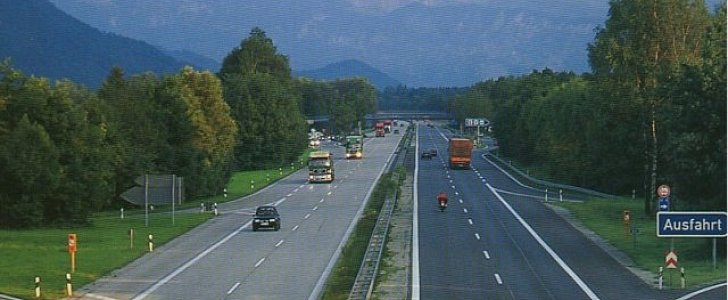Despite the brilliant colors it uses when projecting its self-image abroad, Germany is one of the most fossil fuel-addicted countries in Europe. Its primary source for electricity is coal, and all the efforts it is making on becoming greener in other industries are sabotaged by this harsh reality.
Still, the country seems hell-bent on placing most of the blame for its pollution levels, as well as hopes for a greener future, on the transportation sector.
Currently, a government committee is working on future proposals for this sector that would help reduce the levels of harmful emissions.
Among the measures being discussed seems to be a proposal to virtually end the era of no-speed-limit on the sections of the Autobahn where such a thing is still possible, according to German media.
The idea is to enforce a general speed limit of 130 kph (80 mph) across the country’s highway network, which combined with an increase in fuel prices from 2023 and the end of tax breaks for diesel cars should, in theory, help Germany cut its emissions and avoid being hit by European Union fines.
The committee, called the National Platform on the Future of Mobility (NPM), is to present its recommendations this spring, after missing the initial deadline set for the end of 2018.
It’s not yet clear how much of an impact enforcing speed limits would have on emission levels, nor how many of the recommendations will actually become a reality. After all, such proposals have been made before in Germany.
Germany’s largest industry is car manufacturing, and although its success is not directly linked to the country having a no-speed-limit network of roads, this industry has often been associated with the freedom granted by anyone’s right to drive their cars as fast as they can go.
On the other hand, a no-speed-limit Germany is but a myth, as currently there are countless restrictions on local highways.
The number of kilometers where speeding was allowed has decreased dramatically in the past decades, fueled mostly by the expansion of inhabitable zones and the number of crashes recorded on certain stretches of road.
Currently, a government committee is working on future proposals for this sector that would help reduce the levels of harmful emissions.
Among the measures being discussed seems to be a proposal to virtually end the era of no-speed-limit on the sections of the Autobahn where such a thing is still possible, according to German media.
The idea is to enforce a general speed limit of 130 kph (80 mph) across the country’s highway network, which combined with an increase in fuel prices from 2023 and the end of tax breaks for diesel cars should, in theory, help Germany cut its emissions and avoid being hit by European Union fines.
The committee, called the National Platform on the Future of Mobility (NPM), is to present its recommendations this spring, after missing the initial deadline set for the end of 2018.
It’s not yet clear how much of an impact enforcing speed limits would have on emission levels, nor how many of the recommendations will actually become a reality. After all, such proposals have been made before in Germany.
Germany’s largest industry is car manufacturing, and although its success is not directly linked to the country having a no-speed-limit network of roads, this industry has often been associated with the freedom granted by anyone’s right to drive their cars as fast as they can go.
On the other hand, a no-speed-limit Germany is but a myth, as currently there are countless restrictions on local highways.
The number of kilometers where speeding was allowed has decreased dramatically in the past decades, fueled mostly by the expansion of inhabitable zones and the number of crashes recorded on certain stretches of road.

